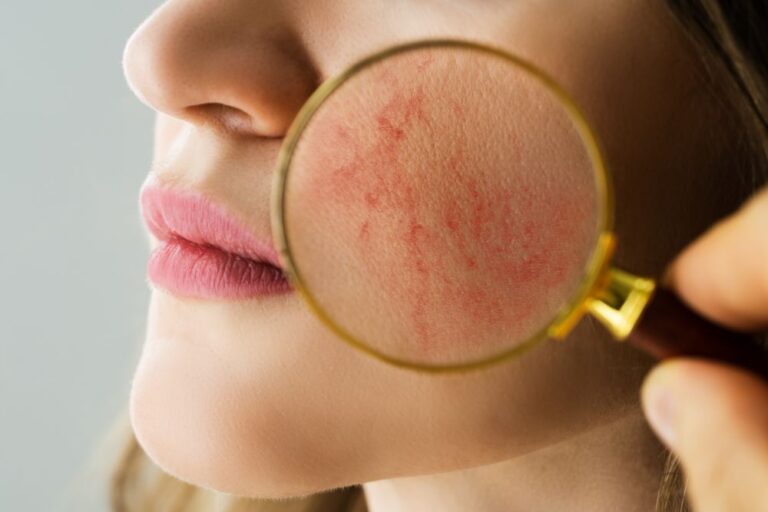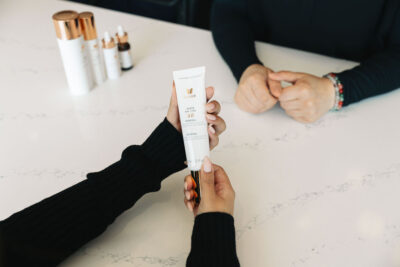August 19, 2025
Rosacea is a chronic skin condition that not only affects appearance but also causes discomfort in those who experience flare-ups. Individuals often seek ways to manage rosacea symptoms through lifestyle and dietary changes.
The first step in managing rosacea is understanding which foods tend to trigger flare-ups. Individuals suffering from rosacea often report sudden redness, visible blood vessels, and burning sensations following the ingestion of particular foods. A careful review of the diet can reveal common food triggers.
Foods That Trigger Rosacea Symptoms
Spicy Foods Leads to Rosacea Intense Flare-Ups
Foods high in capsaicin, commonly found in hot sauce and chili peppers, can cause vasodilation and intensify redness. Studies indicate that capsaicin might provoke nerve responses that exacerbate rosacea symptoms, making these items a frequent trigger for many individuals.
Dairy Products Leads to Inflammatory Reactions for Rosacea
Dairy, including milk and cheese, may worsen rosacea for specific people. Hormones and proteins present in dairy can interact with the innate immune system, triggering increased inflammation and sensitivity. Some patients find that switching to lactose-free alternatives helps ease their symptoms.
Alcohol Leads to Vasodilation and Redness
Alcohol, especially red wine and champagne, is a common trigger for rosacea. Its tendency to dilate blood vessels often results in flushing and persistent redness, which can be distressing for those affected by this condition. Additionally, certain types of fish or specific preparation methods, though generally considered healthy, can indirectly lead to flare-ups in sensitive individuals.
Seafood and Fish Leads to Histamine Release
Some seafood can release histamines, which are substances that unexpectedly trigger inflammatory responses in sensitive individuals. Although fish is generally considered healthy, certain varieties or preparation methods can indirectly lead to flare-ups.
Caffeinated Beverages Leads to Stimulatory Effects
Coffees, iced teas, and energy drinks can increase heart rate and stimulate the nervous system. These effects may worsen rosacea by heightening bodily stress responses, which are closely linked to skin inflammation.
Beneficial Foods for Rosacea Management
Managing rosacea also involves incorporating beneficial foods that help maintain skin balance and reduce inflammation. A diet rich in anti-inflammatory nutrients and hydration is essential for soothing irritated skin and promoting overall health.
Anti-Inflammatory Foods That Help Soothe the Skin
Anti-inflammatory foods like leafy greens, berries, and fatty fish are rich in antioxidants and nutrients that help reduce oxidative stress. Incorporating these foods into your diet can aid in managing inflammation, a primary factor in rosacea flare-ups.
Benefits of Hydration and Its Effects on Rosacea
Maintaining proper hydration is among the simplest yet most effective ways to support skin health. Water plays a critical role in cellular repair and overall detoxification. Sufficient hydration can improve the skin’s barrier function, reducing the risk of irritation and flares.
Fruits and Vegetables That Promote Skin Health
Fruits and vegetables not only provide essential vitamins but also contain bioactive compounds that support skin integrity. Blueberries, oranges, and bell peppers are particularly beneficial due to their high levels of antioxidants, including vitamin C. A diet rich in colorful fruits and vegetables simultaneously supports immune health, thus indirectly easing the severity of rosacea symptoms.
Connection Between Food and Skin Health
A balanced diet that is rich in vitamins, minerals, and antioxidants is essential for maintaining healthy skin. Consuming a variety of nutrient-dense foods helps ensure that the skin receives the necessary elements for repair and regeneration.
This balance supports the skin’s basic functions and enhances its ability to resist external irritants. With proper nutrition, the skin is better equipped to manage inflammation and repair itself in response to damage, which can lead to fewer and less severe rosacea flare-ups.
Frequently Asked Questions
What are the primary food triggers for rosacea?
Common triggers include spicy foods, dairy products, alcohol, and certain seafood. These items can provoke inflammatory responses or cause vasodilation, leading to flare-ups. Identifying personal triggers through a food diary is highly recommended.
How can anti-inflammatory foods benefit rosacea?
Anti-inflammatory foods such as leafy greens, fatty fish, and berries provide antioxidants and essential nutrients that help calm inflammatory processes. These foods contribute to skin repair and improved barrier function, reducing flare intensity over time.
Are supplements necessary for managing rosacea?
While not necessary for everyone, supplements such as omega-3 fatty acids, probiotics, and antioxidants can enhance skin health when dietary intake is lacking. It is best to consult a physician to determine the appropriate supplementation that can be tailored to individual needs.
What types of treatments does VIDA Dermatology offer for rosacea?
VIDA Dermatology provides a personalized, multi-faceted approach to rosacea management, which may include:
-
Prescription Medications: Topical and oral options to reduce redness, bumps, and inflammation.
-
Lasers and Light Devices: Technologies like IPL and specialized lasers to target persistent redness and visible blood vessels.
-
Specialized Skincare Regimens: Guidance on gentle products and crucial sun protection.
-
Lifestyle Modifications: Advice on identifying and avoiding personal triggers.
Get expert rosacea treatments in Edmonton at VIDA Dermatology. Safe, effective care to help you achieve clear, healthy skin. Book your consultation today!



